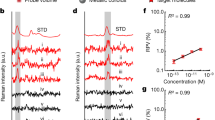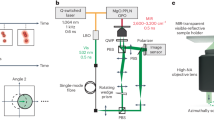Abstract
A BEAM of radiation passing through an emulsion can be attenuated by both absorption and scattering effects. Quantitative absorption measurements on such systems are only reliable when the effects of scattering are made small in comparison with those of absorption ; that is, when the ratio of the refractive indices of the two phases approaches unity and when the size of particle is considerably less than the wave-length. For milk, the ratio of the fat/serum refractive indices is approximately 1.1 and since the mean fat globule diameter of homogenized milk samples is about 1µ, scattering effects will be expected to be small at wave-lengths greater than 5µ. Homogenization will therefore reduce photometric errors caused by variations in the sizes of fat globules of milk samples from cows of different breeds and in different states of lactation.
This is a preview of subscription content, access via your institution
Access options
Subscribe to this journal
Receive 51 print issues and online access
$199.00 per year
only $3.90 per issue
Buy this article
- Purchase on Springer Link
- Instant access to full article PDF
Prices may be subject to local taxes which are calculated during checkout
Similar content being viewed by others
References
Phipps, L. W., Lab. Practice, 9, 313 (1960).
Author information
Authors and Affiliations
Rights and permissions
About this article
Cite this article
GOULDEN, J. Quantitative Analysis of Milk and other Emulsions by Infra-Red Absorption. Nature 191, 905–906 (1961). https://doi.org/10.1038/191905a0
Issue Date:
DOI: https://doi.org/10.1038/191905a0
Comments
By submitting a comment you agree to abide by our Terms and Community Guidelines. If you find something abusive or that does not comply with our terms or guidelines please flag it as inappropriate.



